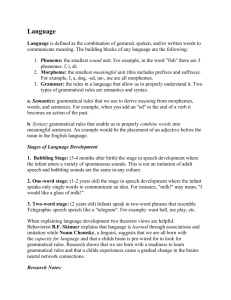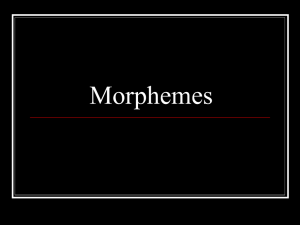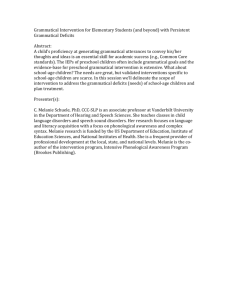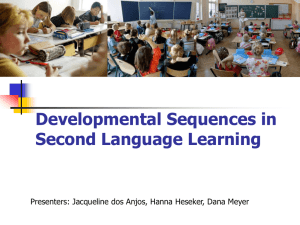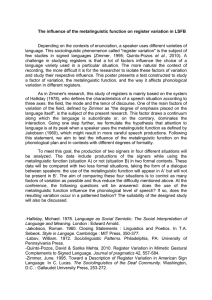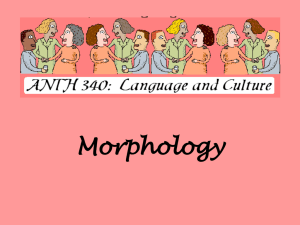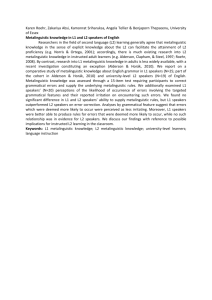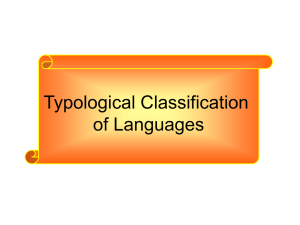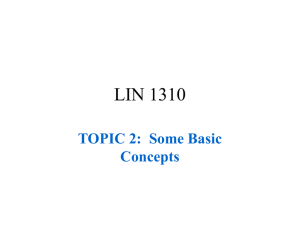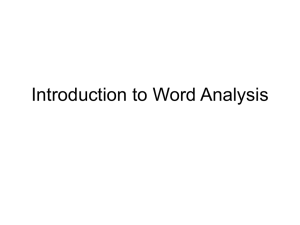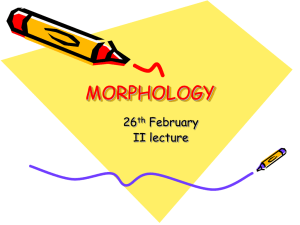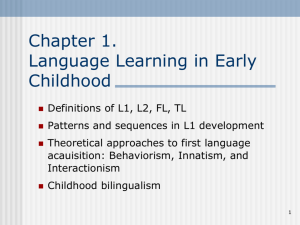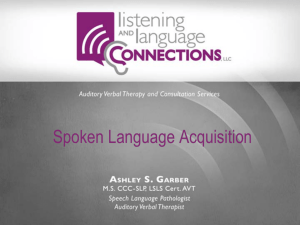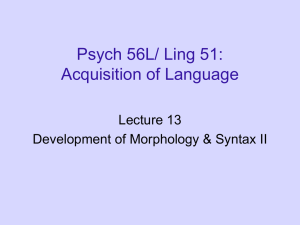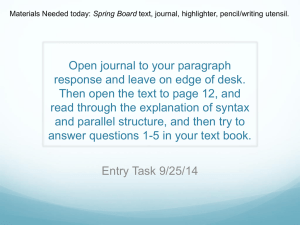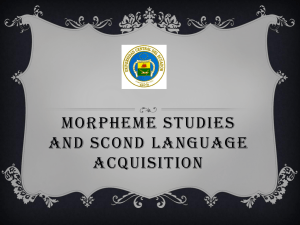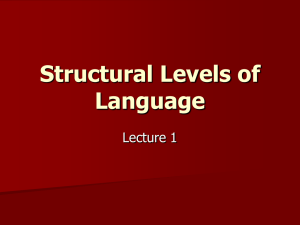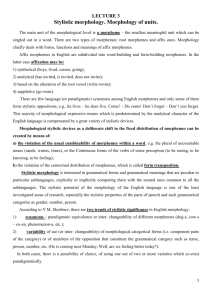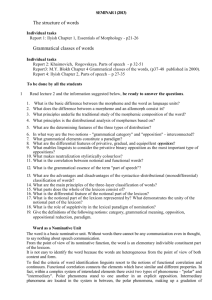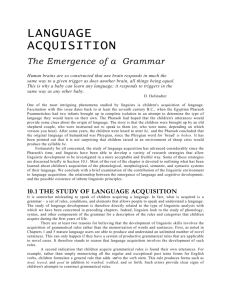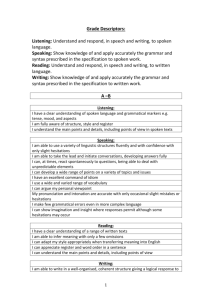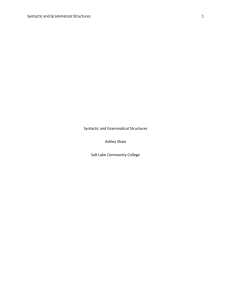Developmental Sequences
advertisement
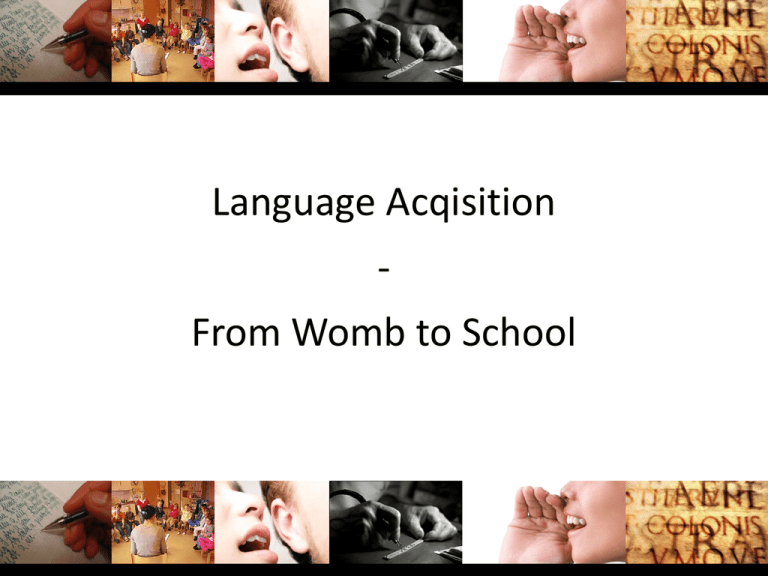
Language Acqisition From Womb to School Content • Pre/Postnatal Language Development • The First Three Years • The Pre-School Years • The School Years Pre/Postnatal Development • language acquisition already starts in the womb • unborn babies have a relatively well-developed auditory system • they are able to perceive and recognize their mother's voice • by the end of one month, babies are already able to perceive phonetic differences • their own production is limited to crying • first oral communication • babies are physically not able to articulate “proper” sounds • they start cooing (besides crying) - earliest unit of signaling in the vocal mode • babies interact with their environment actively • milestone in language acquisition: babbling – occurs between 6-8 months of age – reduplicative babbling – dadada – variagated babbling – kadabu • first words • critical mass • telegraphic sentences - function words and grammatical morphemes The First Three Years • Characteristics of the stages of language learning: – predictable patterns in the emergence and development of many features of the language that is being learned (depending on the cognitive development) – reflection of the gradual mastery of linguistic elements Linguistic elements 1.Grammatical morphemes 2.Negation 3.Questions Grammatical morphemes 1. 2. 3. 4. 5. Present progressive –ing (Mommy running) Plural –s (Two books) Irregular past forms (Baby went) Possessive ‘s (Daddy‘s hat) Copula (Annie is happy) 6. Articles the and a 7. Regular past –ed (She walked) 8. Third person singular simple present –s (She runs) 9. Auxiliary be (He is coming) Why are these grammatical morphemes acquired in the observed order? – frequency of occurrence in parents´ speech – cognitive complexity of the meanings – difficulty of perceiving/ pronouncing the morphemes The ´Wug Test´: ´Here is a wug. Now there are two of them. There are two _____________.´ ´Here is a man who knows how to bud. Yesterday he did the same thing. Yesterday he _____________.´ Demonstration that children know the rules for the formation of plural and simple past in English. systematic development Negation: Stage 1: No. No cookie. No comb hair. Stage 2: Daddy no comb hair. Don’t touch that! Stage 3: I can’t do it. He don’t want it. Stage 4: You didn’t have any supper. She doesn’t want it. I don’t have no more candles. Questions: – predictable order of emergence of ´wh´-questions 1.what 2.where and who 3.why 4.how and when Acquisition of word order in questions: Stage 1: Cookie? Mummy book? Where‘s Daddy? What‘s that? Stage 2: You like this? I have some? Stage 3: Can I go? Are you happy? Is the teddy is tired? Do I can have a cookie? Stage 4: Are you going to play with me? Do dogs like ice-cream? Stage 5: Are these your boots? Why did you do that? Does Daddy have a box? Negative Question: Why the teddy bear can’t go outside? Embedded Question: Ask him why can’t he go out? Stage 6: Able to do all types of questions. The Pre-School Years Pre-school development contains several aspects of language usage: – Lexis – Grammatical awareness – More various usage of language – Error and mistake rate decreases rapidly – Metalinguistic awareness Lexis: – The rate of vocabulary learning is for three to four year old children at several words a day Grammatical awareness: – At the age of four: most children can ask questions, give commands, report real events and create imaginery stories – They apply grammatical rules correctly and master basic structures of the language – Acqisition of more complex linguistic structures including passives and relative clauses More various usage of language: – Usage of language in a wider social environment – More interaction with unfamiliar adults – Communication to relatives on the phone – Awareness of several different “voices“ Metalinguistic awareness: Metalinguistic awareness describes the ability to treat language as an object seperate from the meaning • Example: “Drink the chair“ “Cake the eat“ The School Years • Pre-school language abilities expand and grow • More sophisticated metalinguistic awareness (learning to read) • Vocabulary growth • Acquisition of different language registers • Metalinguistic awareness: – Children learn to read (major boost in language acquisition) – Children learn: language has form and meaning (a word is separate from the thing it represents) – Discovering of ambiguity • Vocabulary growth: – Entering school: hundreds/few thousands of words can be understood/produced – Several hundreds to more than 1000 words a year can be acquired – More different wordfields are explored (especially academic language) • Language registers: – Children learn: • How written language differs from spoken language • How language differs depending on the social situation (principal vs. playground) • How language differs depending on the literary quality of a text (science report vs. narrative) • Some children: regional/ethnic language variety vs. standard variety Thank you for your attention
